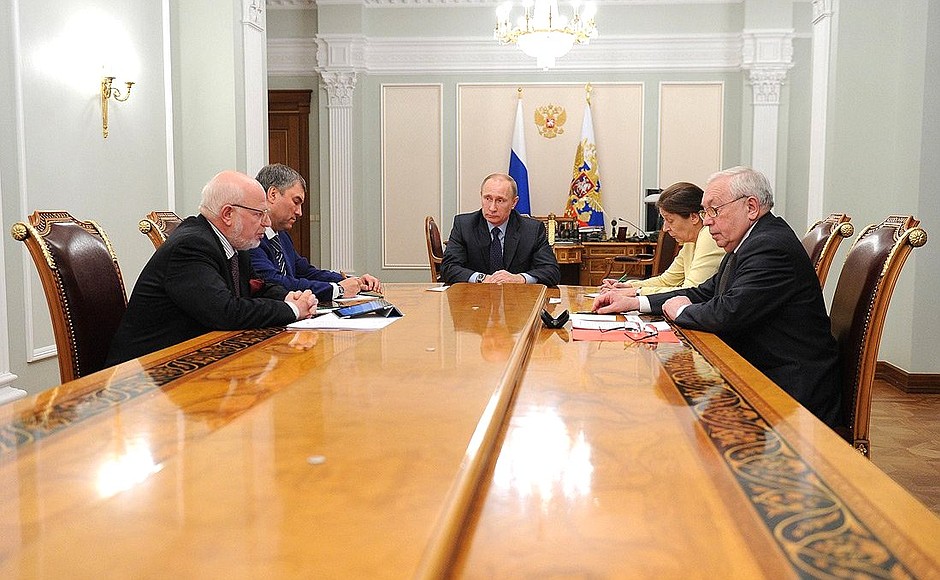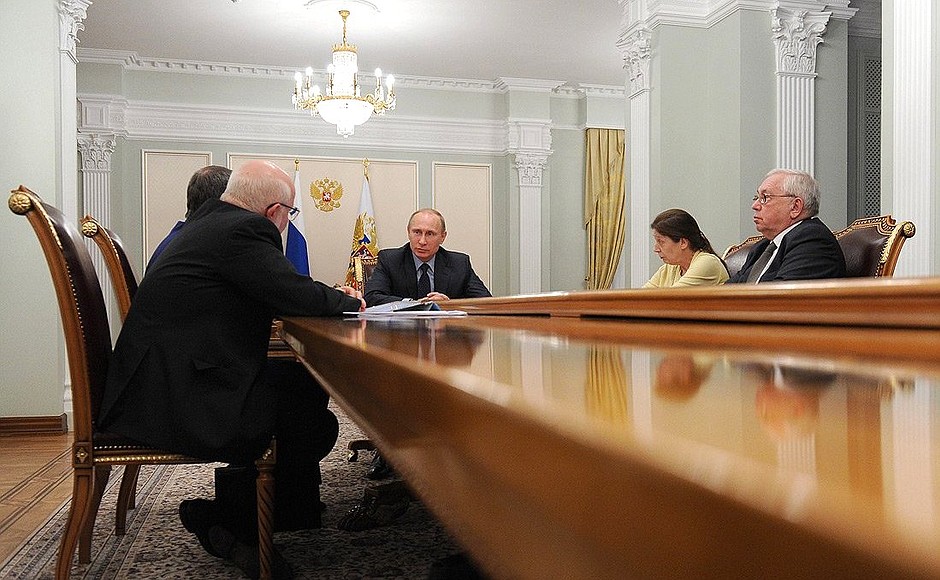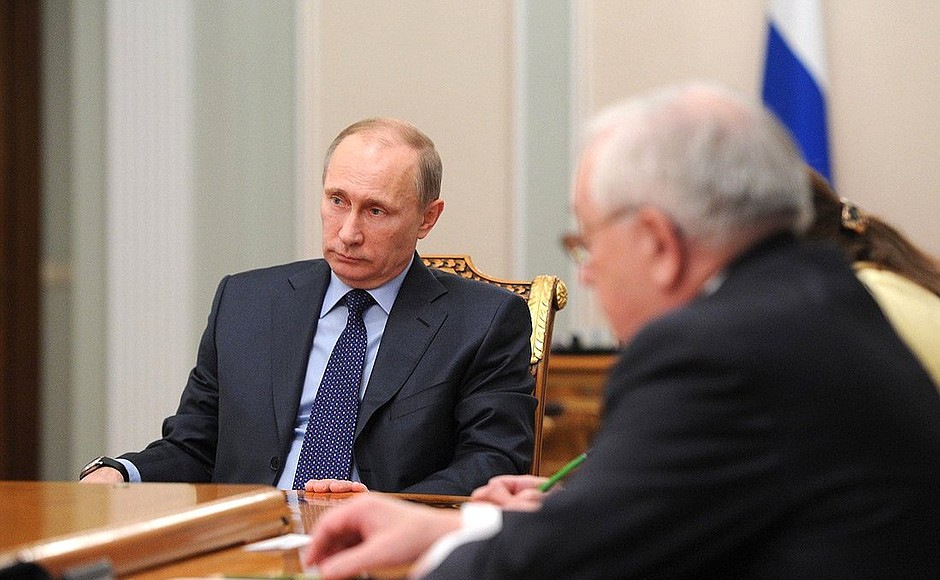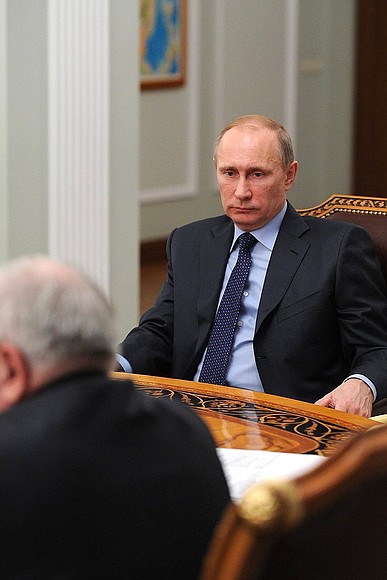Also taking part in the meeting were Deputy Chief of Staff of the Presidential Executive Office Vyacheslav Volodin and Presidential Aide and Head of the Presidential State-Legal Directorate Larisa Brychyova.
* * *
President of Russia Vladimir Putin: Colleagues,
As I see it, we will continue some of the discussions that we began during meetings of the Presidential Council for Human Rights. Please, go ahead.
Presidential ADVISER AND CHAIRMAN OF THE COUNCIL FOR CIVIL SOCIETY AND HUMAN RIGHTS MIKHAIL FEDOTOV: During your meeting with the Council on September 4, we raised the matter of declaring an amnesty to mark the 20th anniversary of Russia’s Constitution. You said then that this is something we need to think about, instructed the Council to draft proposals and gave us a deadline of October 15. On October 11, we discussed the draft proposals at a Council meeting. The proposals were approved by the majority of the Council’s members and were sent to the Presidential Executive Office.
We discussed these matters informally before the meeting. There are various points of view and differences of opinion regarding the details. But it is important that there is an understanding that everyone who has taken part in the discussions agrees in principle with the idea that the Constitution’s 20th anniversary is a fitting occasion to sum up some results and draw a line.
In this respect, I would like to make reference to Professor Pavel Lyublinsky, who wrote 100 years earlier that the positive impact of an amnesty is first in that it has a calming effect and takes some of the antagonism out of social and political relations, and second, it has a strengthening effect in that it raises the moral, religious and other authority of the government that grants the amnesty.
In the context of the decisions that have already been made on reforming the public administration, law enforcement, and judicial systems, an amnesty would be a very logical step. There have already been 16 amnesties granted since the new Constitution came into force. There were even cases of two amnesties in a single year, big amnesties what’s more, concerning up to 700,000 people (the biggest amnesty of all was in 2000). There were also amnesties that concerned only a small group of people, the last amnesty for example, the so-called ‘economic amnesty’.
I have a review drawn up by the Supreme Court. It shows that as at October 1, 2013, 401 people had criminal proceedings against them stopped or were released from prison by the courts on the basis of an amnesty. Only 400 people in other words.
Vladimir Putin: But they are also all people too. The individual fates of each of these 400 people are important.
Mikhail Fedotov: Of course, but the institution of pardons exists for this purpose too. Pardons are a more personalised and individualised institution, whereas an amnesty is a non-individualised act.
I want to note another issue too, what I would call a problem of an organic nature. The matter is that the Constitution contains provisions on amnesties, which are directly linked to the Criminal Code’s provisions, and the Administrative Offences Code also refers to amnesties. In other words, amnesties can be declared for administrative cases, administrative offences too. There is no precedent here as yet, but I think that for all the difficulties, you have to start somewhere, and so one of the measures that we propose concerns an amnesty for administrative offences, in particular, as regards migrants.
<…>
Human Rights Ombudsman Vladimir Lukin: We studied the draft amnesty proposal very thoroughly. Overall, we think it is a good and serious basis to work with. I know there were some comments regarding incompleteness of exceptions to the amnesty, and there are some problems in that area.
But this does not mean that the amnesty proposal itself is not good. It is a good proposal and indeed I think it is one of the best amnesty proposals. An amnesty is indeed an act of state and political nature that demonstrates a government’s strength and generosity all at once.
In this respect, I think the amnesty should be broad and include various different areas. There are of course exceptions that must be considered too, people accused of awful crimes such as paedophilia and so on. But in the case of people whose offences are not very serious, we could take a humane approach towards them, and I think this would only make the country more stable rather than the contrary.
<…>
Vladimir PUTIN: We will be going over the document together with the State Duma deputies, and I ask you to take an active part in this work. Mr Lukin, I ask you too, to work together with the deputies.
I heard what you said about non-violent crimes, and I want to say that this amnesty can apply only to people who have not committed serious crimes or crimes involving violence against the state’s representatives. I am referring to the law enforcement personnel above all of course. I ask you to keep this in mind, and to work out the details with the State Duma deputies.
I agree with you that this kind of action should have a conciliatory effect and should underscore our country’s humane approach. But it should in no circumstances apply to repeated criminals, and it should not encourage new legal violations by giving anyone the impression that you can commit a crime or offence today, tomorrow get the state’s forgiveness, and thus do as you please.
What we need of course is a balanced decision that without question aims to humanise our law enforcement practice. This is my position, and I will be waiting for the final document that you draft together with the State Duma deputies.



